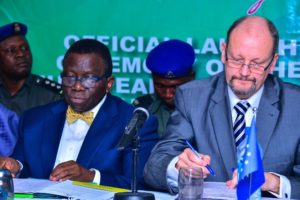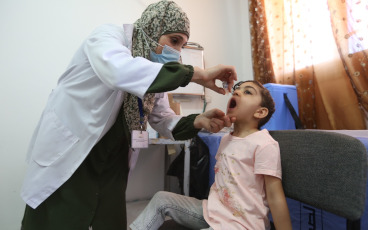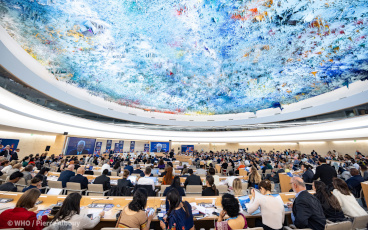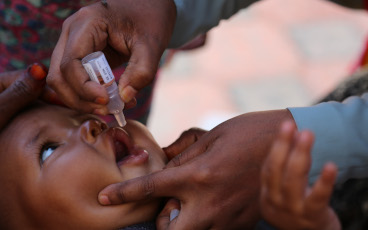EU provides critical support to health systems strengthening and polio eradication in Nigeria
A €70 million EU grant will support polio eradication and efforts and health systems strengthening in Nigeria

At an event in Abuja on 16 February 2017, the Government of Nigeria and the European Union signed a historic partnership to support health systems and polio eradication efforts in the country. Attended by key ministries and partners such as WHO and UNICEF, a €70 million grant agreement was signed targeted at improving maternal, newborn and child health, strengthening Nigeria’s health system and supporting ongoing efforts to eradicate polio.
The project is the first phase of support from the European Union to the Nigerian health sector under the 11th European Development Fund, and will be jointly implemented by United Nations Children’s Fund (UNICEF) and the World Health Organization (WHO) in partnership with the Federal Government of Nigeria and key target states in the country.
Fifty million euro of the grant aims to ensure that by 2020, Adamawa, Bauchi and Kebbi states of Nigeria have functional primary health care centers, providing round-the-clock services to three million children under the age of five years as well as to almost a million pregnant women and lactating mothers.
Twenty million euro, to be dispersed by WHO, will go specifically towards health systems strengthening to achieve universal health coverage and support the push to eradicate polio from Nigeria for good. The grant comes at a critical time for polio eradication in Nigeria, with emergency efforts underway to stop the virus in the last remaining polio reservoir on the African continent.
Michel Arrion, the EU Ambassador to Nigeria and ECOWAS, said at the event, “The European Union is working together with the Nigerian authorities to address developmental challenges in key priority areas under its 11th European Development Fund. This project will help to improve access to effective health and nutrition in the prioritized states and support the final push to eradicate polio in Nigeria”.
The EU has been major supporter of polio eradication efforts worldwide and in particular Nigeria, providing €45 million to the country between 2011 and 2017. Additionally, the EU has provided significant emergency funding to help successfully stop past outbreaks in the Horn of Africa and the Middle East, and supported the eradication effort in other parts of the world.
Thanking the EU for on-going commitment, Dr Wondimagegnehu Alemu, WHO Country Representative, said, “Our partnership with the EU will enable the organization to continue providing the necessary technical support to the government of Nigeria towards strengthening health systems and enhancing timely interventions during supplemental immunization activities, including reaching children in areas with insecurity in the northeast.”
Polio eradication efforts have always played an important role in health systems strengthening. The polio network routinely conducts surveillance for other diseases of public health importance, including measles, yellow fever, neonatal tetanus and avian influenza. With local knowledge of communities, health systems and government structures, the polio network’s technical capacity in disease surveillance and planning of large-scale operations often helps sustain international and national relief efforts. At the country level, polio staff spend, on average, 50% of their time working on broader public health efforts, over and beyond polio eradication, providing a critical contribution to strengthening of health systems.












